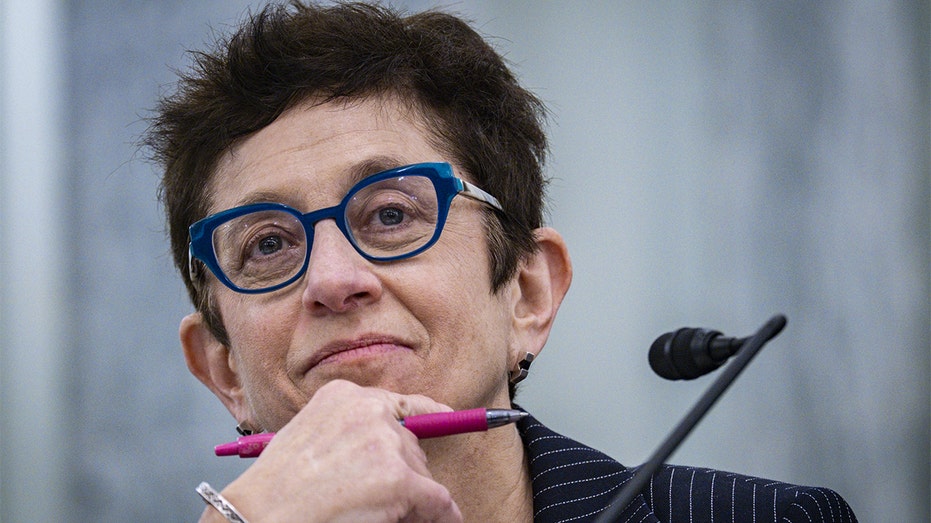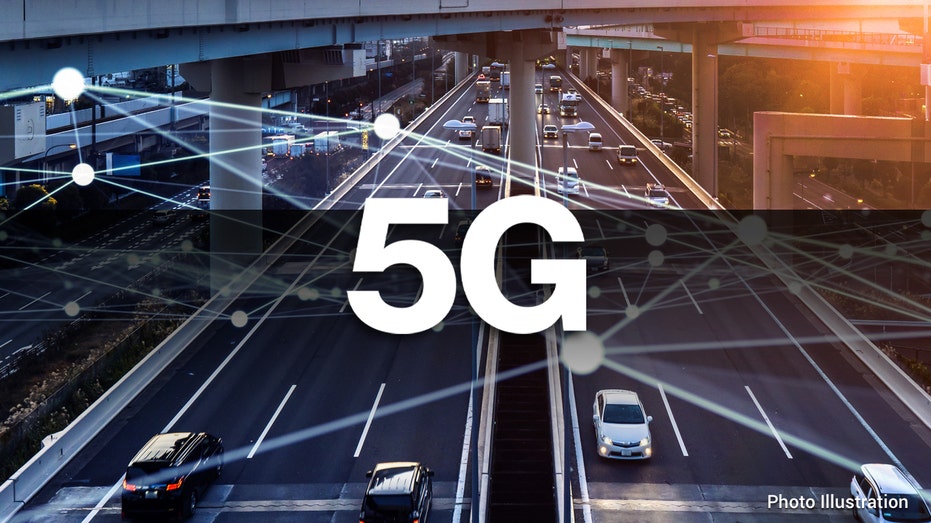Biden FCC nominee prompts new questions on rural internet access
How the FCC approaches 5G could have major implications for rural broadband access
FCC nominee grilled on alleged conflicts of interest over recusals: Gasparino
Sources tell FOX Business' Charlie Gasparino that Gigi Sohn's second confirmation hearing included tough questions from both sides of the aisle.
President Joe Biden’s nominee to serve on the Federal Communications Commission could come with yet another caveat regarding a battle between billionaires Elon Musk and Michael Dell over spectrum for internet access.
Several tech executives and advocacy groups want to allocate a public resource known as 12 GHz spectrum in a way that critics say would block out satellite internet services that are already delivering connectivity to hundreds of thousands of Americans across rural America. Satellite internet services have been a means for delivering internet service to rural America and tribal lands, particularly in mountainous regions.
Biden’s FCC nominee, Gigi Sohn, is tied to two advocacy groups lobbying for the spectrum change. However, she hasn’t taken a formal stance on the issue during her confirmation hearing.
"If you set aside satellites only for extremely rural areas, ultimately the business model will not work," Jim Dunstan, general counsel for TechFreedom, told FOX Business. "Starlink and other companies still need a subscriber base. They still need suburbs and urban areas. If satellites have to compete against the local cable or phone companies, that doesn’t help the satellite guys."
DELTA TESTS ELON MUSK'S STARLINK AS INTERNET PROVIDER FOR FLIGHTS
In some instances, this places the satellite companies in direct competition with local government-owned companies that have an advantage over private companies, Dunstan said.
"For municipal-owned utilities, municipal governments can play stupid government tricks and can make life miserable for competitors," Dunstan said. "To deploy 12 GHz to 5G, you would take away from the satellite guys. It’s great for urban areas, but the 5G is not more likely to get to rural areas. This would rob the rural areas to pay the urban."
MSD Capital, a private money management firm linked to Michael Dell, the founder of Dell Technologies, has called for the FCC to adopt a new policy for 12 GHz.
This policy could also have a particular impact on the Musk-owned Starlink firm that provides internet access to about 250,000 homes and businesses. In 2020, SpaceX urged the FCC not to expand the availability of the 12GHz spectrum.

Elon Musk (AP Photo/Matt Rourke / AP Newsroom)
However, the two spectrums — 5G and 12GHz — can co-exist without interfering with one another, contends Chip Pickering, CEO of Incompass and co-chairman of the 5G for 12GHz Coalition.
Moreover, Pickering doesn’t think approval of expanding the GHz spectrum relies on Sohn’s confirmation.
"I don’t see this depending on her confirmation. We think this has been a completely bipartisan process," Pickering, a former Republican House member, told Fox News. "In the race with China for 5G, this gives us an advantage in connecting every American, in rural areas especially, as well as urban areas. What we have now is a great waste of one of the most valuable strategic assets we have."
Sohn's ties
If confirmed, Sohn would be the third Democrat on the FCC, currently split 2-2.
Sohn is a senior fellow at the Benton Institute for Broadband and Society, an organization that is part of the 5G for 12 GHz Coalition.
The 5G for 12GHz Coalition includes Dell Technologies. The Benton Institute board of directors includes Mignon Clyburn, a former FCC commissioner and daughter of House Majority Whip James Clyburn, D-S.C.

Gigi Sohn, President Biden's nominee for commissioner of the Federal Communications Commission, during a Senate Commerce, Science and Transportation Committee confirmation hearing in Washington Feb. 9, 2022. (Pete Marovich/The New York Times/Bloomberg via Getty Images / Getty Images)
Sohn is also the co-founder and former CEO of the tech nonprofit Public Knowledge, which along with DISH Network is a member of the coalition backing the spectrum change. Dish Network holds licenses in the 12 GHZ band covering about 75% of the United States and would be in position to build the 5G network. Dish has donated at least $50,000 to Public Knowledge.
In a written questionnaire from members of the Senate, Sohn received several questions about 12 GHZ spectrum but was generally noncommittal and not clear on how she thought it would affect satellite internet service providers.
"As I stated at the hearing, 5G is going to be a transformative technology. I agree that the commission should study the 12 GHz band issues before moving forward. If confirmed, I look forward to reviewing the record of the proceeding," Sohn responded to one of the questions, the same as she replied to other questions on the same topic.
Senate response
The Senate Commerce Committee deadlocked 14-14 on Sohn’s nomination, but she could still likely get a floor vote in the 50-50 Senate where Vice President Kamala Harris can cast a tie-breaking vote to the Democrats' advantage.
Sohn addressed some of these issues in her responses to written questions from members of the Senate Finance Committee.
Sen. Dan Sullivan, R-Alaska, noted that in 2021, Sohn told a House panel, "Policymakers have focused disproportionately on broadband deployment in rural areas of the United States. Americans who live in cities also face enormous challenges to broadband connectivity."
Sullivan asked, "Would you agree that extremely rural, frontier communities with no broadband infrastructure at all — like many in Alaska — perhaps deserve disproportionate focus from policymakers?"
She responded that she spent two decades with the "goal of ensuring that every household in the U.S. — both rural and urban — has robust and affordable broadband Internet access."
"I also recognize that there are communities and states, like Alaska, where deployment is more challenging," she wrote in response to Sullivan. "I support the broadband provisions in the infrastructure bill because, not only did Congress require that the funding goes to unserved areas first, it also requires that the states receive and distribute the funds."

In response to a question from Sen. Tim Scott, R-S.C., about whether private investment in satellite internet could eventually reduce or replace the need for government-funded broadband, she expressed doubt — and identified the Musk-owned company.
GRAHAM: BIDEN FCC COMMISSIONER NOMINEE WOULD BE A 'COMPLETE NIGHTMARE'
"The FCC under the Rural Development Opportunity Fund invested $886 million into Starlink, indicating that even satellite broadband will require public investments," Sohn wrote in response to Scott's question. "There are also challenges with satellite broadband that do not make it a replacement for traditional fiber-based deployment.
A coalition of 20 conservative and free market groups, which includes Americans for Tax Reform and FreedomWorks, signed onto a March 25 letter urging the Senate to reject Sohn’s nomination.
"Sohn’s confirmation would jeopardize investment and innovation, threaten free speech and bring partisanship to the FCC," the letter says.
Lobbying for the change
Communications Daily reported that the 12 GHz coalition anticipates FCC Chairwoman Jessica Rosenworcel "appears to be waiting for the Senate to confirm Gigi Sohn as the third Democrat on the FCC, but if that doesn’t happen soon, they hope the agency will act with the current 2-2 split."
"There’s a growing recognition that the FCC should move forward on authorizing the 12 GHz band for 5G," Jeff Blum, Dish Network executive vice president of external and legislative affairs told Communications Daily in March. "It’s a bipartisan issue."
However, DISH Network signed onto a 2016 filing with the FCC that said a base receiver using their technology would interfere with a base station for satellite internet within 11 kilometers.
The same filing cited a study that said even a mobile device within 22 meters of a satellite internet device would cause interference. It goes on to quote a coexistence study that concludes the sharing of certain 12 GHz band in the same geographic area as satellites is "impractical, if not infeasible."
DISH acknowledged there's a risk of interference in a March SEC filing that said, "Despite regulatory provisions intended to protect DBS [direct broadcast satellite] and FSS [fixed satellite service] operations from harmful interference, there can be no assurance that operations by other satellites or terrestrial communication services in the DBS and FSS bands will not interfere with our DBS and FSS operations and adversely affect our business."
Buying spectrum is not new for Dell’s personal investment company, MSD Capital. Starting in 2011, the firm spent at least $90 million to buy more than 20 struggling TV stations. In 2017, Dell sold the spectrum rights from 10 of those stations for almost $440.7 million, The Wall Street Journal reported.




















